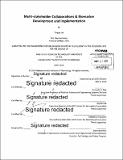Multi-stakeholder collaborations & biomarker development and implementation
Author(s)
Liu, Tingyu
DownloadFull printable version (9.743Mb)
Alternative title
Multi-stakeholder collaborations and marker development and implementation
Other Contributors
Massachusetts Institute of Technology. Technology and Policy Program.
Advisor
Kenneth A. Oye, Gigi Hirsch, and Magdalini Papadaki.
Terms of use
Metadata
Show full item recordAbstract
The rise of genomic technologies and increasing interest in personalized medicine have triggered a renewed focus on the role of biomarkers in drug development and clinical care. While many stakeholders, including industry, regulatory agencies, patients, academia, and payers, are involved in biomarker development and use, these stakeholders reside in functional siloes that lead to fragmented outputs and efforts. Thus, although biomarker discovery is extensive, biomarker adoption in the R&D process and clinical care is slow, complex, and opaque. The gap between discovery and practice needs to be bridged by clear and consistent evidentiary standards, regulations and policies. Biomarker adoption requires a systems effort that includes active dialogue and understanding among all stakeholders. The level of discussions and resources (data, samples, expertise, financial, etc.) needed also makes this field particularly fertile for collaboration. This thesis suggests that multi-stakeholder collaborations (MSCs) can address the challenges of biomarker adoption. It describes what has been achieved in existing prominent MSCs, extracts general lessons on their contributions, and provides recommendations on the use of MSCs in drug development. Specifically, MSCs have demonstrated impact across 4 key areas: 1) data generation and establishment of standards; 2) development of scientific processes for biomarker evaluation and use; 3) the structuring of innovative operational and organizational scaffolds for collaboration; and 4) delivery of vetted regulatory recommendations and robust biomarkers for use by drug developers and clinicians. Understanding the roles, evolution, and challenges of MSCs will be important in enhancing the capacity to collaborate to address the complex challenges for biomedical innovation and healthcare outcomes.
Description
Thesis: S.M. in Technology and Policy, Massachusetts Institute of Technology, Engineering Systems Division, Technology and Policy Program, 2014. Cataloged from PDF version of thesis. Includes bibliographical references (pages 55-65).
Date issued
2014Department
Massachusetts Institute of Technology. Engineering Systems Division; Technology and Policy ProgramPublisher
Massachusetts Institute of Technology
Keywords
Engineering Systems Division., Technology and Policy Program.